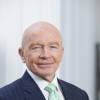Mark Mobius

Mark Mobius
Joseph Mark Mobiusis an emerging markets fund manager at Franklin Templeton Investments. Mark Mobius, Ph.D., executive chairman of Templeton Emerging Markets Group, joined Templeton in 1987. Currently, he directs the Templeton research team based in 18 global emerging markets offices and manages emerging markets portfolios. In 2015, after leading the company for a quarter of a century, Mark Mobius decided to step down as the lead manager of the Templeton Emerging Markets Investment Trustand handed over control of the fund...
NationalityAmerican
ProfessionBusinessman
Date of Birth17 August 1936
CountryUnited States of America